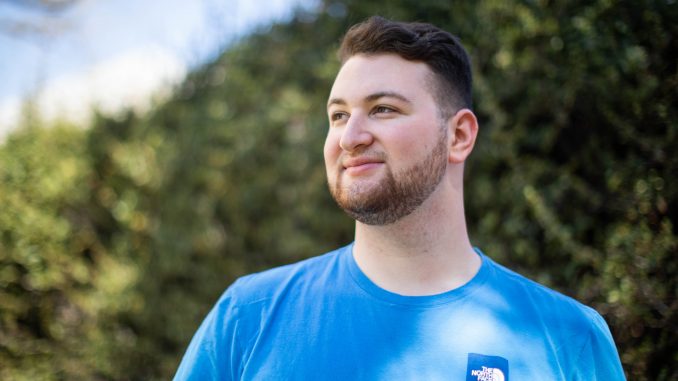
Louis Myers sat in the waiting room of Temple University Hospital in early September with a fever, cough and a sore throat when his phone rang.
It was Temple’s Student Health Services letting him know he tested positive for COVID-19.
Myers, a freshman undeclared major, is one of the hundreds of Temple students who’ve tested positive for COVID-19 throughout the 2020-21 academic year. Students juggled academics, personal lives and their physical and mental health while experiencing 10 days of required isolation after testing positive for COVID-19.
After leaving the hospital, the university gave Myers two hours to pack up his belongings at 1300 Residence Hall, where he lived at the time, and move to Temple’s isolation housing at Johnson and Hardwick halls.
Johnson and Hardwick halls became isolation housing for students who test positive for COVID-19 during the 2020-21 academic year, The Temple News reported. One of the buildings will remain isolation housing in the Fall 2021 semester.
Students who test positive for COVID-19, whether living on or off campus, can isolate in Johnson and Hardwick halls or at home, The Temple News reported.
People with mild cases of COVID-19 can stop isolating 10 days after their symptoms first appeared and 24 hours without a fever or 10 days after they tested positive for COVID-19. Those with severe cases may need to isolate up to 20 days, according to the Centers for Disease Control and Prevention.
Staff at Temple’s Office of University Housing and Residential Life contact students who choose to move into isolation housing and gives them directions on packing and the quarantining process at Johnson and Hardwick halls, The Temple News reported.
Myers moved into isolation housing for 10 days on Sept. 7, 2020. He had a double room and an entire hallway to himself, including the communal bathroom, he said.
Active cases of COVID-19 among students peaked at 349 on Sept. 6, 2020, The Temple News reported. As of April 12, there are 125 active cases of COVID-19 on Temple’s campus, The Temple News reported.
“Once I got to my room, I think I remember like, calling my parents like, telling them like, how sad I was because of the situation I was in,” Myers added. “You’re really stuck in there by yourself.”
Myers’ professors offered extensions on assignments, but because classes were online and his symptoms subsided quickly, Myers didn’t use them, he said.
Lauren Novak, a freshman film and media arts major, felt COVID-19 symptoms while helping a friend move to a different residence hall in September 2020 when Temple condensed housing because classes transitioned online and students moved home.
“I was like, pushing a cart of his stuff and I just felt exhausted like, I literally had to like, lean up against the wall and I was like, ‘Guys, I need a break. I can’t do this,’” Novak said.
She tested positive after experiencing headaches, brain fog and exhaustion during the weekend and stayed on campus because her parents are at high risk for COVID-19-related complications. Novak moved into Johnson and Hardwick halls on Sept. 9, 2020, and was the only person on her floor, she said.
“I just felt like, really lonely,” Novak said. “I called everyone like, all the time, I tried to make sure I wasn’t alone. But I did a lot of sleeping.”
The Wellness Resource Center created resources about self-care and dealing with loneliness for students in isolation, The Temple News reported.
Young adults are less likely to be hospitalized after contracting COVID-19, but many work in food service, retail or childcare, giving them a higher risk of contracting COVID-19, according to Johns Hopkins Medicine.
Lucy Niyazova was leading a Zoom event on a Sunday for a campus club in September 2020 when she started feeling feverish, she said.
Niyazova, a junior communication studies and education major, quarantined in her off-campus apartment that night, wearing a mask outside of her room and wiping down the shared spaces after using them.
She was tested for COVID-19 that Monday. On Tuesday, she got a call from Student Health Services with her positive results and started crying.
“There are students that don’t really follow protocol and stuff like that for COVID, but our apartment was very strict about it,” Niyazova said. “We did everything to ensure that nobody got COVID, and it was such a slap in the face to still get it.”
Niyazova continued quarantining in her room, but eventually, she and her roommates decided to all quarantine together for 10 days in their off-campus apartment.
Niyazova and her roommates played board games and watched movies, which helped Niyazova’s mental health improve, she added.
When her symptoms subsided, Niyazova emailed her professors and set up Zoom meetings to discuss how she would make up the work she missed, she said.
After 10 days, Niyazova and her roommates tested negative for COVID-19, she said.
Nearly one in five adults aged 18 to 34 with no underlying health conditions did not return to normal health within two to three weeks after testing positive, according to Harvard Health Publishing.
People who previously had COVID-19 should still be vaccinated, although people who are currently sick with COVID-19 should not be vaccinated until they recover to normal health and have met the criteria to discontinue isolation, according to the CDC. Niyazova received her second shot of the vaccine on Sunday.
While Niyazova was glad to have her roommates to quarantine with, online club meetings and classes to stay connected to peers, she missed being able to go to the library to study, she said.
“Professors were so understanding that I didn’t get penalized for that kind of stuff, which was, again, very helpful,” she said. “But it just, it was not an environment that nurtured creativity or intelligent, you know, writing and stuff like that.”


Be the first to comment